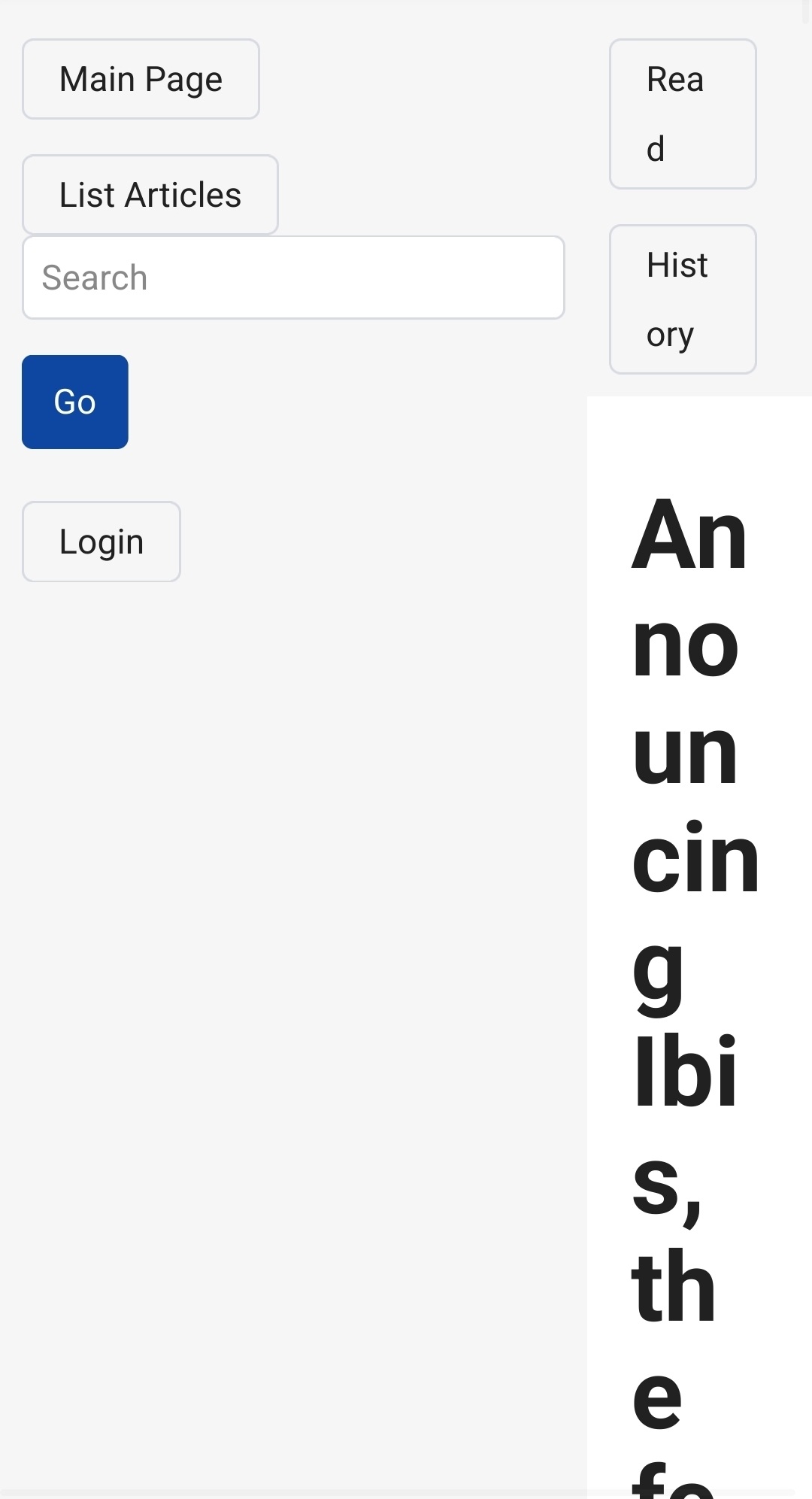I’m rather sceptical that this can work as a good alternative to Wikipedia. Wikipedia’s content moderation system is in my opinion both its greatest strength and its greatest weakness. To create a better Wikipedia, you would have to somehow innovate in that regard. I don’t think federation helps in any way with this problem. I do though see potential in Ibis for niche wikis which are currently mostly hosted on fandom.org. If you could create distinct wiki’s for different topics and allow them to interconnect when it makes sense, Ibis might have a chance there.
deleted by creator
If you think a centralized organization governed by legalism is opaque, just wait until you see a thousand islands of anarchy.
No I think it would actually be great. You could peek at two opposing views on the same article, for example. I’m sure some “instances” would be ripe with disinformation but what’s it to you? Idiots are already lapping up disinformation like candy. It’s not like wikipedia isn’t filled with it already…
You could peek at two opposing views on the same article, for example.
Post-truth as a service.
Post-truth as a service.
If you read through this page you might even conclude that Wikipedia itself is “post-truth”
https://en.wikipedia.org/wiki/List_of_Wikipedia_controversies
At any point in time you could be reading a defaced or propagandized version of an article.
Not only is the noise ratio low, this seems like a good lesson in “encyclopedias are not primary sources nor arbiters nor authorities on information.” Yes, people use Wikipedia that way anyway. No, baking in an even lower trust system does not seem like it’s actually a fix to any of Wikipedia’s problems.
Removed by mod
I don’t need opposing views on subjects, I need the most accurate one that’s the best researched and sourced.
Good thing Wikipedia articles are always the best researched and sourced!
In 2023, Jan Grabowski and Shira Klein published an article in the Journal of Holocaust Research in which they said they had discovered a “systematic, intentional distortion of Holocaust history” on the English-language Wikipedia.[367] Analysing 25 Wikipedia articles and almost 300 back pages (including talk pages, noticeboards and arbitration cases), Grabowski and Klein stated they have shown how a small group of editors managed to impose a fringe narrative on Polish-Jewish relations, informed by Polish nationalist propaganda and far removed from evidence-driven historical research. In addition to the article on the Warsaw concentration camp, the authors conclude that the activities of the editors’ group had an effect on several articles, such as History of the Jews in Poland, Rescue of Jews by Poles during the Holocaust and Jew with a coin. Nationalist editing on these and other articles allegedly included content ranging “from minor errors to subtle manipulations and outright lies”, examples of which the authors offer.[367]
- 367: Grabowski, Jan; Klein, Shira (February 9, 2023). “Wikipedia’s Intentional Distortion of the History of the Holocaust”. The Journal of Holocaust Research. 37 (2): 133–190. doi:10.1080/25785648.2023.2168939. ISSN 2578-5648. S2CID 257188267.
So? Is your alternative free of mistakes and bias?
I don’t think they’re suggesting wikipedia currently is “best researched and sourced,” just that a federated alternative wouldn’t automatically solve that issue.
…isn’t the good idea here to not enhance visibility of disinformation?
deleted by creator
We’re talking about the fediverse here. It’s such a niche place and there are already wildly opposing views and information existing on Lemmy itself.
And that’s not even mentioning the situation on bigger social media platforms and the broader web!
Considering some of the ungodly biased wikipedia alternatives I see tossed around on Lemmy, I’m not too confident Ibis will end up any better.
Besides, first I’m hearing of Wikipedia losing trust.
I’m going to use your comment to tell people to download Indie Wiki Buddy. It’s a plug-in for your browser that redirects Fandom to independent alternatives. I highly recommend it.
The fact is that we can’t rely on any single website to hold the whole world’s knowledge, because it can be corrupted sooner or later. The only solution is a distributed architecture, with many smaller websites connecting with each other and sharing information. This is where ActivityPub comes in, the protocol used by Mastodon, Lemmy, Peertube and many other federated social media projects.
Thank god Lemmy has no malicious users/bad actors/spam issues…
Interesting idea anyway. I would be a bit more worried that when important information is siloed onto instances, each instance becomes a point of failure, and thus can be corrupted or lost.
Good luck :)
Right? Right now with Wikimedia, everything is hosted in one place and moderated in one place. Having everything spread about in various instances with varying degrees of moderation and rules, and the option to block other instances is not great for information quality and sharing.
Wikipedia has strict notability requirements, which is what spawned the popularity wikia/fandom which is a pretty terrible user experience.
Wikipedia also has an infamously pro-neoliberal bias.
If an instance goes down, the articles are still stored on other federated instances.
A mirror would accomplish the main stated aim of backing up information just as well if not better.
Whereas as you implied, allowing multiple sources of information seems vulnerable to disinformation campaigns, and even more simply bias.
This feels like a hasty “solution” to an invented “problem”. Sure, Wikipedia isn’t squeaky clean, but it’s pretty damn good for something that people have been freely adding knowledge to for decades. The cherry-picked examples of what makes Wikipedia " bad" are really not outrageous enough to create something even more niche than Wikia, Fandom, or the late Encyclopedia Dramatica. I appreciate the thought, but federation is not a silver bullet for everything. Don’t glorify federation the way cryptobros glorify the block chain as the answer to all the problems of the world.
So you’re saying you want a federated wiki that uses a blockchain??? Genius.
Kidding aside, you’re absolutely right. Wikipedia is one of the very few if not ONLY examples of centralized tech that ISN’T absolute toxic garbage. Is it perfect? No. From what I understand, humans are involved in it, so, no, it’s not perfect.
If you want to federate some big ol toxic shit hole, Amazon, Netflix, any of Google’s many spywares – there’s loads of way more shitty things we would benefit from ditching.
Edit: the “federated Netflix” – I know it sounds weird, but I actually think it would be really cool. Think of it more like Nebula+YouTube: “anyone” (anyone federated with other instances) can “upload” videos, and subcription fees go mostly to the creator with a little going to The Federation. Idk the payment details, that would be hard, but no one said beating Netflix would be easy.
And federated Amazon – that seems like fish in a barrel, or low hanging fruit, whichever you prefer. Complicated and probably a lot more overhead, but not conceptually challenging.
Federated Netflix? We already have federated YouTube, it’s called PeerTube
Yeah I was thinking more of a paid service, I guess more like Nebula then Netflix, since Netflix just shows TV shows and movies made by big companies. I don’t mind paying for things if they’re good things, and I know the right people are getting the money for it.
There’s a wiki program that natively uses a version control repository, Fossil. You can fork a Fossil wiki and contribute updates back to the original.
It wouldn’t be too hard to for example create a few Fossil repositories for different topics where the admins on each are subject matter experts (to ensure quality of contributions), and then have a client which connects to them all and with a scheme for cross linking between them
Peertube already exists for video, it’s more like a different take on bittorrent.
I’ve just realised that I independently came up with the idea for federated services while imagining how to make yt better over 5 years ago.
Cool!
I mean we have seen how the Lemmy devs approach certain topics, and it is definitely not with a preference for openness or free exchange of ideas. There are certain topics here which have a hair trigger for content removal and bans, for extremely petty and minor “transgressions,” so the motivation here seems pretty transparent.
Everyone should see how incredibly important this project is, and its potential. Wikipedia is yet another US-controlled and domiciled site, with a history of bribery, scandals, and links to the US state department. It has a near-monopoly on information in many languages, and its reach extends far outside US borders. Federation allows the possibility of connecting to other servers, collaborating on articles, forking articles, and maintaining your own versions, in a way that wikipedia or even a self-hosted mediawiki doesn’t.
Also ibis allows limited / niche wikis, devoted to specific fields, which is probably the biggest use-case I can see for Ibis early on.
Congrats on a first release!
If this kills Fandom/Wikia, that would be amazing and somewhat realistic.
Thank you!
Thank you!
US-controlled and domiciled site - yes, but I do not see it having a monopoly on information at all. Sure is big, has lots of info, pages, it is a rather good resource in linking stuff to the various concepts that you want to explain others e.g. in an argument.
But the very fact that anyone can edit information makes it not recommendable in academia, for example (really, when I was a student, all my professors were generally not recommending it for information because, as one of them said, even grandma could edit it). So I don’t think I would trust ibis on scientific articles either, at least not in the fields I’m directly interested in - maybe for some random trivia/did you know stuff, idk.
limited / niche wikis
But this is where I think it would really shine, indeed, as one could make a wiki about a game or software more easily, probably link pages from different instances, etc. (as others said already).
Don’t know what else to say, it just seems like an interesting project. Congrats to anyone involved on this first release and looking forward to see what this project will bring.
I don’t think a federated wiki is solving any of the problems of wikipedia. You’ve just made a wiki that is more easily spammed and will have very few contributors. Yes, Wikipedia is centralized, but it’s a good thing. No one has to chase down the just perfect wikipedia site to find general information, just the one. The negative of wikipedia is more its sometimes questionable moderation and how its english-centric. This has more to do with fundamentally unequal internet infrastructure in most countries than anything though. Imperialism holds back tech.
I agree that it might be fine for niche wikis but again, why in the world would you ever want your niche wiki federated? Sounds like a tech solution looking for the wrong problem.
I think it solves the problems of Fandom, but yeah Wikipedia is good
Self-hosting any wiki software solves the problems of Fandom, surely? I fail to see how federation solves any of Fandom’s issues.
No, for the same reason forums can’t replace reddit. Self hosted wikis have been around before and after fandom. The reason it became popular was giving you all the fandom wikis together, one account, discoverable, user friendly so regulars can contribute. If I have to sign up to every fandom wiki I can contribute to, learn a new interface (likely something old and not mobile friendly) and rebuilt up any reputation to gain extra editing rights… I just won’t.
Ibis then in theory allows you to use one account, federate your reputation, use one interface, with lots of third party options if you don’t like the official one (if lemmy is any indication) and have discoverability of new wikis.
There is actually at least one other: Conservapedia. It’s for people who live in a weird right-wing fantasy land.
Conservapedia views Albert Einstein’s theory of relativity as promoting moral relativism, …
ithinkihadastroke
But… wikimedia is already self hostable.
Wikimedia isn’t written in Rust, so it’s useless /s
@13 @nutomic @vis4valentine how helpful is sarcasm huh
Instead of individual, centralized websites there will be an interconnected network of encyclopedias. This means the same topic can be treated in completely different ways. For example geology.wiki/article/Mountain may be completely different different from poetry.wiki/article/Mountain. There can be Ibis instances strictly focused on a particular topic with a high quality standard, and others covering many areas in layman’s terms.
I don’t think something like this exists yet(?), so it’ll be cool to see how this will be like.
As an academic I love this. On Wikipedia there’s actually fights among different expert disciplines going on. It is better to allow different instances operated by different discipline summarize knowledge from their own perspective.
To be fair, those are good faith arguments with the goal being to determine the real, objective truth. Hopefully.
That is not how this tool would be used, in the hands of people not trained in the art of socratic discourse. Just imagine how the situation in Gaza would end up being described.
Avoiding conflict is not always a useful aim.
I can respect your comment. The problem with Wikipedia’s scholarly articlesI wanted to raise was that some group of researchers (or businesses) wash away others’ views. In other times, mathematicians try to satisfy everyone from different disciplines, and write a very abstract article that covers everyone’s view yet is too academic and hardly readable to most readers who actually need Wikipedia.
The goal of academic research is to inform the best and brightest of the real information. For e.g. academic extensions to how nuclear power works, or for engineers to have a working basis to build a viable power plant, and so on.
The goal of an encyclopedia though is arguably different: to make people “feel” informed, without necessarily being so? Or at least to serve as a starting point for further studies, maybe?
Science marches ever onwards, and eventually that gets collected into textbooks, and even later into encyclopedias. Or maybe now we’re working from a new model where it could skip that middle step? But science still seems leagues ahead of explanations to the masses, and whereas in science the infighting is purposeful and helpful (to a degree), the infighting of making something explainable in a clearer manner to more people is also purposeful and helpful, though federating seems to me to be giving up on making a centralized repository of knowledge, i.e. the very purpose of an “encyclopedia”?
Science reporting must be decentralized, but encyclopedias have a different purpose and so should not be, maybe? At least not at the level of Wikipedia.
If you’re correct, to me the usefulness of Wikipedia is actually different from that of encyclopedia, and the pattern I’m arguing goes against that.
Fair. Though that capability - e.g. the identical wikia software, implementing the MediaWiki protocol - already exists. Maybe federating it would somehow improve it, though it would also open it up to have greater vulnerabilities especially when non-scientists get involved, e.g. a w/article/conservative/vaccine vs. a w/article/real/vaccine. Scientists can handle these controversies, but people who do not have the base knowledge with which to properly understand, e.g. ivermectin, are not going to be able to distinguish between the truth vs. the lies.
So the people that would put it to the best use don’t absolutely need it - sure it would be nice but peer-reviewed articles already exist - while the ones for whom it would be most damaging are almost certainly going to be the primary target audience.
This is super exciting. I think one of the things a lot of people are missing here is the potential for small wikis to augment existing fediverse communities. Reddit’s killer feature has always been the massive treasure trove of information for hobbyists and niche interests. There is huge potential in the fediverse to take advantage of that sort of natural collaborative knowledge building process.
Our SLRPNK Dokuwiki integration is finally working now. Let me know if you want to test-drive it in the coming days.
lemmy.dbzer0.com also has a DjangoWiki attached, with lemmy integration. How did you do your integration?
Nothing fancy, just account linking via the Lemmy database.
Can you share the deets on how you did it? Currently I’m doing it via API which requires people to add a specific string to their username
Ah I see you’re using a specific dw plugin
I started a post along these lines on !ibis@lemmy.ml. I, personally, think this will be the killer application for Ibis.
It is not well known but there have been numerous scandals which put this trust into question. For example in 2012, a trustee of the Wikimedia Foundation UK used his position to place his PR client on Wikipedia’s front page 17 times within a month. Wikipedia founder Jimmy Wales made extensive edits to the article about himself, removing mentions of co-founder Larry Sanger. In 2007, a prolific editor who claimed to be a graduate professor and was recruited by Wikipedia staff to the Arbitration Committee was revealed to be a 24-year-old college dropout. These are only a few examples, journalist Helen Buyniski has collected much more information about the the rot in Wikipedia.
I don’t really understand how decentralization would address the trust and legitimacy problems of Wikipedia. I do see value in adding community wikis to Lemmy, however.
The UI on mobile is completely broken.

It’s only mostly broken. And mostly broken means slightly working!
Im not good at frontend development, my goal was to create a very basic frontend which works to show off the project. Going forward I will definitely need help to improve the design or create an entirely new frontend in a different language.
Anyway the main thing about this project is the working federation, but without a basic frontend it would be very difficult to showcase.
Maybe making it work as an headless API and develop a linker to an existing Wiki like Dokuwiki would work better? Something like this plugin that syncs a Dokuwiki with a git backend: https://www.dokuwiki.org/plugin:gitbacked
I’m learning Leptos too, I’ll watch your progress when lost, good luck !
Maybe you can make some contributions to Ibis ;)
The problem I see with federated wikis is potential creation of echo chambers. Current Wikipedia is often a political tug-of-war between different ideological crowds. For instance, on Russian Wikipedia, Russian Civil War article is an infamous point of struggle between communist and monarchist sympathizers, who often have to settle at something resembling a compromise.
If both sides had their own wikis, each would have very biased interpretation of events. A person who identifies as either communist or monarchist would visit only the corresponding wiki, only seeing narrative that fits into their current world view, never being exposed to opposing opinions.
Could this not also be seen as advantageous? If one wants to get nuanced understandings, they could read from multiple wikis written with multiple perspectives, without the tug of war. Presently, as a centralized platform, there’s the back and forth you mentioned with neither side being satisfied.
Assuming people cite their sources and more reputable instances are more developed, this allows for sharing lesser heard perspectives. A flat-earth wiki isn’t going to dominate, because you can’t get valid sources for that.
Overall, cautiously optimistic. I like the idea, and think that as a framework, this is a great thing! It remains to be seen what will come of this, though.
Removed by mod
Wikipedia is not a Big Tech nor a commercial enterprise prone to enshittification nor it profits from surveillance capitalism. We don’t need another, competing, universal source of enclopedical information. Wikipedia, on contrary to X, Reddit, Facebook, etc. is not going anywhere. Any self-styled Wikipedia alternative ended up dead, thematic, or biased by design.
However there are many thematical and fan wikis hosted on Fandom, which itself is a commercial company and there were already some contoversies concerning it. Wikis on Fandom are very resource-intensive compared to Wikipedia or independent thematical wikis.
Ability to edit at several wikis from the same account without being tied to Fandom could be one of things that Ibis offers and could benefit independent wiki sites.
And of course, MediaWiki is free software and federation could be added as a functionality.
Wikipedia is biased by design though…
Everything is biased. Even saying something as simple as “grass is green” is biased, it has the bias of normal colour perception. I’m colour blind and don’t see grass as green.
No shit! So it’s not exactly a counter-point to the concept of a “Wikipedia alternative”
Any self-styled Wikipedia alternative ended up dead, thematic, or biased by design
With biased by design I have meant something like Conservapedia, RationalWiki, etc… They do not try to make neutral point of view, as is (or at least should be) applied on Wikipedia.
Each instance would ideally have their own standards for neutrality or bias that they see fit. It’s no different from self-hosted wikis except with the federation concept appllied on top of it. I’m sure someone will create an instance that is a straight up clone of wikipedia, another person will create an instance for everything pro-communism / pro-china, someone will create a strictly anti-theism wikipedia, etc.
I don’t see anything wrong or weird about this, the skepticism this project is receiving is stupid. It’s nothing new under the sun.
@nutomic An interesting initiative. Good luck!
I do notice one unfortunate difference from Wikipedia immediately: Wikipedia is functional with scripts blocked, Ibis Wiki is not. I’m sure that even Wikipedia nowadays has some functions that don’t work without scripts, but a wiki that won’t even display its landing page without scripts enabled, is dead while still in the gate.
The frontend is very primitive right now, but it could definitely be made to work without JS.
@nutomic I’d recommend that, albeit not everybody browses with scripts disabled, so not it’s not necessarily the automatic death knell I suggested.
But I’m curious to see how it goes.
Right, and what would also be nice is to be able to export articles in different formats, for example markdown, to conveniently read them in your favourite reader application.
This serves well as a statement.
It is, however, delusional to think that at this point anything can become a viable alternative to Wikipedia, unless Wikimedia collapses because of reasons from within.
All the more reason to push this project forward, as a redundancy.
deleted by creator
The infrastructure is already there in that case, to restore it, and it would be less likely to fall.
Having no sole source of information hosting in an encyclopedic format is safer.
But having an open data project full of information that’s actively contributed to and fact checked, with copies over many servers, is much better than having the same thing but fragmented. I still don’t see a reason. If it was something else or corporate driven, I wouldn’t bat an eye. But Wikipedia?
You can have all of that good if you want to, but being federated allows people to break off if they want. It also allows for niche servers.
So contribute to the statement.
When Wikipedia collapses, it will be too late to create an alternative from scratch.
When working on lemmy is too relaxing so you need another project to keep you busy :D
I was waiting for someone else to create a project like this. But it didnt happen so I had to write it myself when things became a bit calmer with Lemmy.
You call this calm? :D
But I know the feeling. I didn’t really want to run a lemmy but reddit made it intolerable not to and here we are. I should be working on my main project >_<
Nowadays I can easily handle all Github notifications within less than an hour. After the Reddit blackout there were so many notifications that I couldnt even read all the issues, let alone respond. So I had to unsubscribe from issue notifications for some months.
Well, I was more referring to all the drama around lemmy lately due to lacking mod tools etc
Right but that’s already over. And anyway Ibis was mostly finished since some weeks, just needed some minor work to push it over the finishing line.
With all due respect, but that’s not over. There’s still a significant lack of mod tooling on lemmy.
I mean the drama about it is over. We are constantly working to improve mod tools but it takes time.
There’s Jerboa as well, lol
deleted by creator
deleted by creator
































